Featured Articles
Canelo Wins Strategic Battle Over Daniel Jacobs in Las Vegas
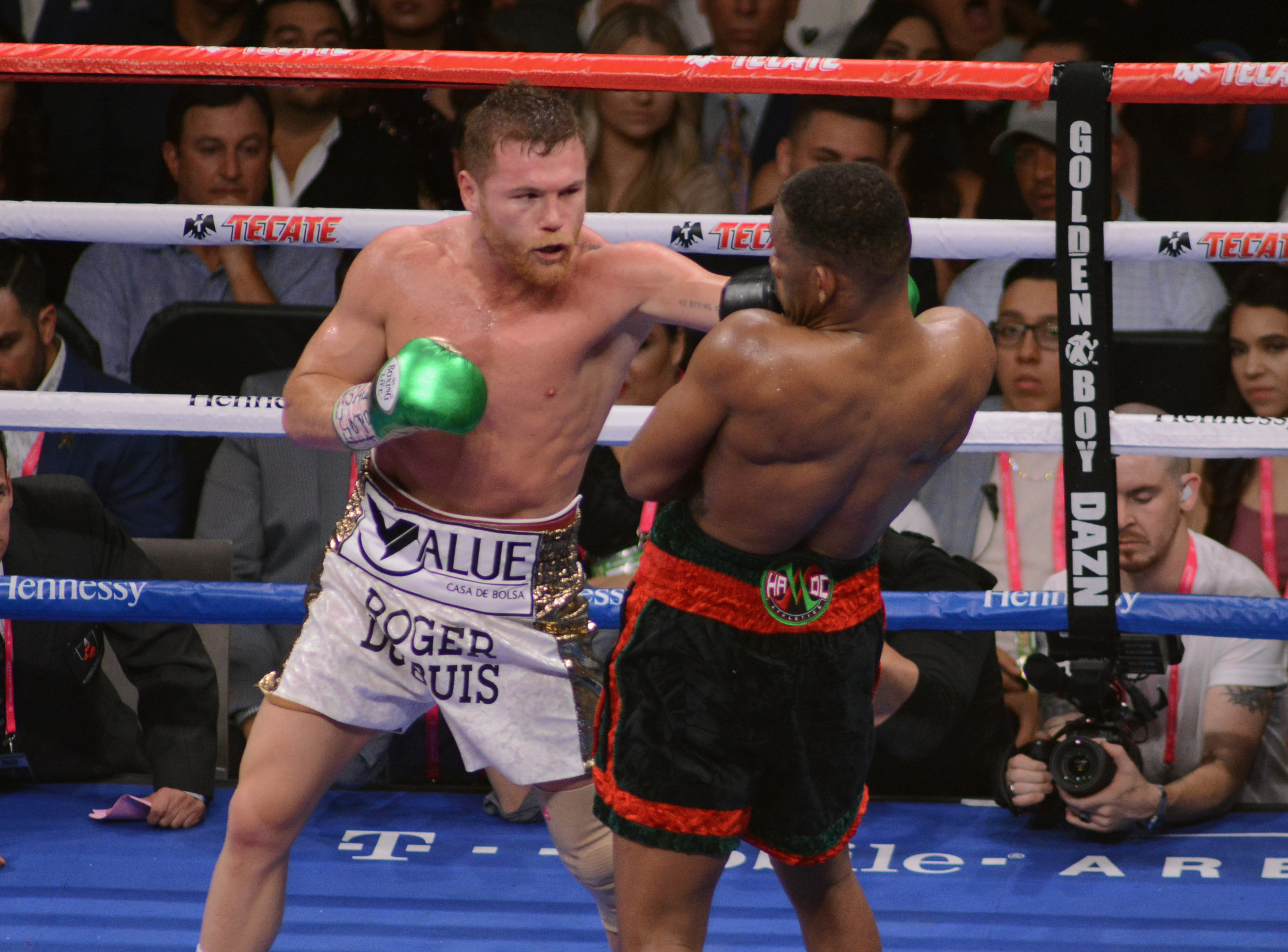
LAS VEGAS-Mexico’s Saul “Canelo” Alvarez won a tactical battle by unanimous decision over Brooklyn’s Daniel Jacobs that saw several changes over 12 rounds. But now the red head adds the IBF title to his collection of middleweight belts on Saturday.
WBA and WBC titlist Alvarez (52-1-2, 35 KOs) showed the sold out crowd of 20,203 at T-Mobile Arena that the smaller guy can indeed beat the bigger guy Jacobs (35-3, 29 KOs) even though he weighed four pounds more than the contracted weight. It really didn’t matter.
Despite the extra pounds it didn’t prove an advantage for Jacobs who was tentative in the beginning as was Alvarez. But in the second round both began to target the body and the fight slipped into a more aggressive round.
The speed of Alvarez began to tell as he connected with shots to the body and head. And when he felt even more comfortable in the fourth round, the Mexican middleweight began to show off his defensive skills by slipping various combinations fired by Jacobs. The crowd of predominantly Latino fans cheered the exhibition of defensive skill.
“It took me a couple of rounds to get my wits about me. Because he is a pot shotter. He’s a fast guy,” explained Jacobs.
Jacobs changed the strategy of the fight in the fifth round by changing into a southpaw. The move stalled Alvarez’s rhythm and the fight slowed to a crawl. A wicked left cross connected by Jacobs flush to Alvarez’s jaw. It was the Brooklyn fighter’s best punch of the night.
“It was a hard shot, no big deal I continued with my fight,” said Alvarez of the Jacob’s left cross.
Whenever Jacobs used a southpaw stance Alvarez found success with a ramrod left jab. It was his best response to the Jacob tactic. However the crowd did not like the tactic because of the lack of action in produced.
From the 10th round on Alvarez used his quicker hand speed to fire off combinations that kept Jacobs from returning fire. Though the Mexican middleweight was landing combinations whenever Jacobs fought from an orthodox stance, he had problems with the lefty stance by the New Yorker.
Jacobs never surrendered and managed to land shots, but never was he able to hurt Alvarez whose jaw had already been tested twice against the powerful Gennady “GGG” Golovkin in two prior fights. Canelo’s chin was intact and unbreakable against Jacobs. That proved to be a major difference.
Alvarez was able to take chances knowing he could handle Jacobs power. He also knew he could slip Jacobs if necessary. After 12 rounds all three judges agreed that Alvarez was the winner 115-113 twice and 116-112. It was a clear and decisive verdict not bemoaned by Jacobs.
“I have to go back and see exactly what the judges saw. He’s a tremendous champion and I take my hat off for him,” said Jacobs.
The crowd departed the arena satisfied but not exactly ecstatic. Most expected a knockout by either fighter, not a decision.
“It was a thinking fight. He’s a little heavier, it was the right style to fight him,” said Alvarez. “For sure it was a strategic fight. I had to think what to do but it was a matter of switching from left to right.”
Sitting in the audience was former middleweight champion Golovkin. Alvarez was asked if Golovkin would be next on his list.
“For me no, but if the people want it, we can do it again,” said Alvarez. “If the fight is right I’ll fight anyone.”
Vergil Ortiz
Young firebrand Vergil Ortiz (13-0, 13 KOs) lowered the boom on veteran world title challenger Mauricio “El Maestro” Herrera (24-9, 7 KOs) to win by knockout in a fight held in the welterweight division. But only for this fight.
Herrera had fought for the super lightweight world title before and many felt he won against Puerto Rico’s Danny Garcia back in 2014. But against the lean punching machine Ortiz it was a different matter.
After a round of Herrera setting the pace with peppering shots to the body, Ortiz began opening up in the latter half of the second round. A sizzling right hand followed by several blows sent Herrera down at the end of the round. Herrera got up but looked slightly woozy.
In the third round Ortiz was in full stalking mode and Herrera seemed a little groggy. Normally Herrera, who lives in trains in Riverside, Calif. like Ortiz, has shown an uncanny ability to slip punches. But Ortiz cornered Herrera and sent a right cross missile that connected solidly. Herrera was out before a left hook follow-up blow from Ortiz grazed the unconscious fighter. Referee Russell Mora stopped the fight at 29 seconds of round three.
“I’m very satisfied with my performance. I spar world champions all the time,” said Ortiz after the win. “He was keeping his left hand down all the time. I had the fight figured out.”
Despite the success at 147-pounds, Ortiz prefers to drop back to the 140 pound super lightweight limit.
“I want to go back at 140 and get that world title,” said Ortiz who is from Texas but is trained in Riverside, CA, by Robert Garcia. “If they ask me to fight for a world title in two weeks I’ll take it right now.”
Jojo Diaz
Southern California’s Jojo Diaz (29-1, 15 KOs) opened up with a steady battering of Costa Rica’s Freddie Fonseca (26-3-1, 17 KOs) to prove he belongs at the 130-pound super featherweight division.
“I’m able to take more chances and take more risks. At 126 my body would fatigue in the later rounds,” said Diaz a former 2012 USA Olympian. “I’m ready right away for a world title my next fight.”
Diaz had twice fought for world titles in the featherweight division. In his last attempt he failed to make the required weight limit of 126 pounds last August 2018 against Puerto Rico’s Jesus Rojas. Though he won the fight he was unable to win the title.
Lamont Roach Jr. (19-0-1, 7 KOs) took a beating early in the fight but slowly turned things around with distance, counter shots and a point deduction against Puerto Rico’s Jonathan Oquendo (30-6, 19 KOs) late in the fight. But after 10 grueling rounds Roach was given the unanimous decision 96-93 twice and 97-92 and keeps the NABO featherweight title.
From the first round on Roach’s nose was bloodied by an Oquendo blow and was then hurt by body shots. Somehow he shrugged it off and began turning things around with smart fighting on the outside. Oquendo was deducted a point in the eighth round by referee Russell Mora for repeated head butts.
Roach earned the win the hard way.
“He is as tough as they come,” said Roach. “I’ve been hit in the face a lot of times. He hit me with a clean body shot.”
New Jersey’s Anthony Young (21-2, 8 KOs) started fast and finished former world champion Sadam Ali (27-3, 14 KOs) to win a vacant regional welterweight title. Young pummeled former super welterweight world titlist Ali with a barrage of blows in the third round. More than 20 unanswered blows including a left hook to the temple forced referee Robert Byrd to end the fight by technical knockout at 2:38 of round three.
“I saw his fight against (Mauricio) Herrera and he couldn’t pull the trigger,” said Young of Ali’s fight against Southern California’s Herrera in New York. “So when they offered the fight I jumped on it.”
England’s John Ryder (28-4, 16 KOs) floored Australia’s Bilal Akkawy (21-1-1, 16 KOs) twice before referee Jay Nady stopped the fight giving the interim WBA super middleweight title to the British fighter. A left cross floored Akkawy in the third round and he beat the count. Then Ryder cornered the Aussie and fired a four-punch combination that sent Akkawy to the floor once again. The fight resumed and Ryder snapped Akkawy’s head back with a left uppercut forcing referee Jay Nady to halt the fight at 2:12 of round three.
“I picked my shots and put him away,” said Ryder who fights out of London. “To fight in Las Vegas was amazing. To put on a performance like that, possibly the best of my career, makes it all the sweeter.”
Russia’s Aram Avagyan (9-0-1) out-hustled Francisco Esparza (9-1-1) of Las Vegas over 10 rounds to win by unanimous decision in a featherweight fight. Both fighters engaged mostly on the inside with neither fighter hurting the other much. Avagyan won by scores 97-92, 96-93 twice to keep the title.
“I executed the game plan,” said Avagyan.
Photo credit: Al Applerose
Check out more boxing news on video at The Boxing Channel
To comment on this story in The Fight Forum CLICK HERE
Featured Articles
Thomas Hauser’s Literary Notes: Johnny Greaves Tells a Sad Tale
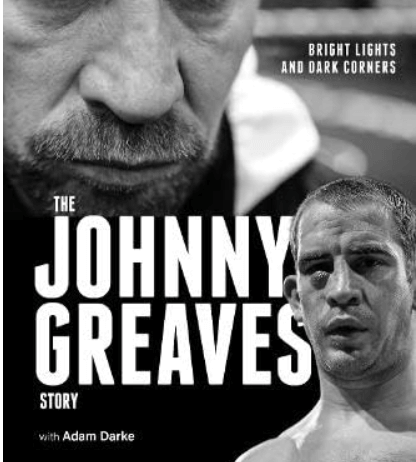
Johnny Greaves was a professional loser. He had one hundred professional fights between 2007 and 2013, lost 96 of them, scored one knockout, and was stopped short of the distance twelve times. There was no subtlety in how his role was explained to him: “Look, Johnny; professional boxing works two ways. You’re either a ticket-seller and make money for the promoter, in which case you get to win fights. If you don’t sell tickets but can look after yourself a bit, you become an opponent and you fight to lose.”
By losing, he could make upwards of one thousand pounds for a night‘s work.
Greaves grew up with an alcoholic father who beat his children and wife. Johnny learned how to survive the beatings, which is what his career as a fighter would become. He was a scared, angry, often violent child who was expelled from school and found solace in alcohol and drugs.
The fighters Greaves lost to in the pros ran the gamut from inept local favorites to future champions Liam Walsh, Anthony Crolla, Lee Selby, Gavin Rees, and Jack Catterall. Alcohol and drugs remained constants in his life. He fought after drinking, smoking weed, and snorting cocaine on the night before – and sometimes on the day of – a fight. On multiple occasions, he came close to committing suicide. His goal in boxing ultimately became to have one hundred professional fights.
On rare occasions, two professional losers – “journeymen,” they’re called in The UK – are matched against each other. That was how Greaves got three of the four wins on his ledger. On September 29, 2013, he fought the one hundredth and final fight of his career against Dan Carr in London’s famed York Hall. Carr had a 2-42-2 ring record and would finish his career with three wins in ninety outings. Greaves-Carr was a fight that Johnny could win. He emerged triumphant on a four-round decision.
The Johnny Greaves Story, told by Greaves with the help of Adam Darke (Pitch Publishing) tells the whole sordid tale. Some of Greaves’s thoughts follow:
* “We all knew why we were there, and it wasn’t to win. The home fighters were the guys who had sold all the tickets and were deemed to have some talent. We were the scum. We knew our role. Give some young prospect a bit of a workout, keep out of the way of any big shots, lose on points but take home a wedge of cash, and fight again next week.”
* “If you fought too hard and won, then you wouldn’t get booked for any more shows. If you swung for the trees and got cut or knocked out, then you couldn’t fight for another 28 days. So what were you supposed to do? The answer was to LOOK like you were trying to win but be clever in the process. Slip and move, feint, throw little shots that were rangefinders, hold on, waste time. There was an art to this game, and I was quickly learning what a cynical business it was.”
* “The unknown for the journeyman was always how good your opponent might be. He could be a future world champion. Or he might be some hyped-up nightclub bouncer with a big following who was making lots of money for the promoter.”
* “No matter how well I fought, I wasn’t going to be getting any decisions. These fights weren’t scored fairly. The referees and judges understood who the paymasters were and they played the game. What was the point of having a go and being the best version of you if nobody was going to recognize or reward it?”
* “When I first stepped into the professional arena, I believed I was tough. believed that nobody could stop me. But fight by fight, those ideas were being challenged and broken down. Once you know that you can be hurt, dropped and knocked out, you’re never quite the same fighter.”
* “I had started off with a dream, an idea of what boxing was and what it would do for me. It was going to be a place where I could prove my toughness. A place that I could escape to and be someone else for a while. For a while, boxing was that place. But it wore me down to the point that I stopped caring. I’d grown sick and tired of it all. I wished that I could feel pride at what I’d achieved. But most of the time, I just felt like a loser.”
* “The fights were getting much more difficult, the damage to my body and my psyche taking longer and longer to repair after each defeat. I was putting myself in more and more danger with each passing fight. I was getting hurt more often and stopped more regularly. Even with the 28-day [suspensions], I didn’t have time to heal. I was staggering from one fight to the next and picking up more injuries along the way.”
* “I was losing my toughness and resilience. When that’s all you’ve ever had, it’s a hard thing to accept. Drink and drugs had always been present in my life. But now they became a regular part of my pre-fight preparation. It helped to shut out the fear and quieted the thoughts and worries that I shouldn’t be doing this anymore.”
* “My body was broken. My hands were constantly sore with blisters and cuts. I had early arthritis in my hip and my teeth were a mess. I looked an absolute state and inside I felt worse. But I couldn’t stop fighting yet. Not before the 100.”
* “I had abused myself time after time and stood in front of better men, taking a beating when I could have been sensible and covered up. At the start, I was rarely dropped or stopped. Now it was becoming a regular part of the game. Most of the guys I was facing were a lot better than me. This was mainly about survival.”
* “Was my brain f***ed from taking too many punches? I knew it was, to be honest. I could feel my speech changing and memory going. I was mentally unwell and shouldn’t have been fighting but the promoters didn’t care. Johnny Greaves was still a good booking. Maybe an even better one now that he might get knocked out.”
* “Nobody gave a f*** about me and whether I lived or died. I didn’t care about that much either. But the thought of being humiliated, knocked out in front of all those people; that was worse than the thought of dying. The idea of being exposed for what I was – a nobody.”
* “I was a miserable bastard in real life. A depressive downbeat mouthy little f***er. Everything I’ve done has been to mask the feeling that I’m worthless. That I have no value. The drinks and the drugs just helped me to forget that for a while. I still frighten myself a lot. My thoughts scare me. Do I really want to be here for the next thirty or forty years? I don’t know. If suicide wasn’t so impactful on people around you, I would have taken that leap. I don’t enjoy life and never have.”
So . . . Any questions?
****
Steve Albert was Showtime’s blow-by-blow commentator for two decades. But his reach extended far beyond boxing.
Albert’s sojourn through professional sports began in high school when he was a ball boy for the New York Knicks. Over the years, he was behind the microphone for more than a dozen teams in eleven leagues including four NBA franchises.
Putting the length of that trajectory in perspective . . . As a ballboy, Steve handed bottles of water and towels to a Knicks back-up forward named Phil Jackson. Later, they worked together as commentators for the New Jersey Nets. Then Steve provided the soundtrack for some of Jackson’s triumphs when he won eleven NBA championships as head coach of the Chicago Bulls and Los Angeles Lakers.
It’s also a matter of record that Steve’s oldest brother, Marv, was arguably the greatest play-by-play announcer in NBA history. And brother Al enjoyed a successful career behind the microphone after playing professional hockey.
Now Steve has written a memoir titled A Funny Thing Happened on the Way to the Broadcast Booth. Those who know him know that Steve doesn’t like to say bad things about people. And he doesn’t here. Nor does he delve into the inner workings of sports media or the sports dream machine. The book is largely a collection of lighthearted personal recollections, although there are times when the gravity of boxing forces reflection.
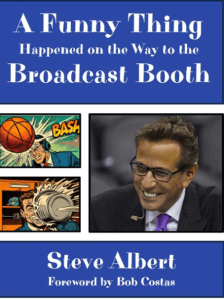
“Fighters were unlike any other professional athletes I had ever encountered,” Albert writes. “Many were products of incomprehensible backgrounds, fiercely tough neighborhoods, ghettos and, in some cases, jungles. Some got into the sport because they were bullied as children. For others, boxing was a means of survival. In many cases, it was an escape from a way of life that most people couldn’t even fathom.”
At one point, Steve recounts a ringside ritual that he followed when he was behind the microphone for Showtime Boxing: “I would precisely line up my trio of beverages – coffee, water, soda – on the far edge of the table closest to the ring apron. Perhaps the best advice I ever received from Ferdie [broadcast partner Ferdie Pacheco] was early on in my blow-by-blow career – ‘Always cover your coffee at ringside with an index card unless you like your coffee with cream, sugar, and blood.’”
Writing about the prelude to the infamous Holyfield-Tyson “bite fight,” Albert recalls, “I remember thinking that Tyson was going to do something unusual that night. I had this sinking feeling in my gut that he was going to pull something exceedingly out of the ordinary. His grousing about Holyfield’s head butts in the first fight added to my concern. [But] nobody could have foreseen what actually happened. Had I opened that broadcast with, ‘Folks, tonight I predict that Mike Tyson will bite off a chunk of Evander Holyfield’s ear,’ some fellas in white coats might have approached me and said, ‘Uh, Steve, could you come with us.'”
And then there’s my favorite line in the book: “I once asked a fighter if he was happily married,” Albert recounts. “He said, ‘Yes, but my wife’s not.'”
“All I ever wanted was to be a sportscaster,” Albert says in closing. “I didn’t always get it right, but I tried to do my job with honesty and integrity. For forty-five years, calling games was my life. I think it all worked out.”
Thomas Hauser’s email address is thomashauserwriter@gmail.com. His next book – The Most Honest Sport: Two More Years Inside Boxing – will be published this month and is available for preorder at:
https://www.amazon.com/Most-Honest-Sport-Inside-Boxing/dp/1955836329
In 2019, Hauser was selected for boxing’s highest honor – induction into the International Boxing Hall of Fame.
To comment on this story in the Fight Forum CLICK HERE
Featured Articles
Argentina’s Fernando Martinez Wins His Rematch with Kazuto Ioka
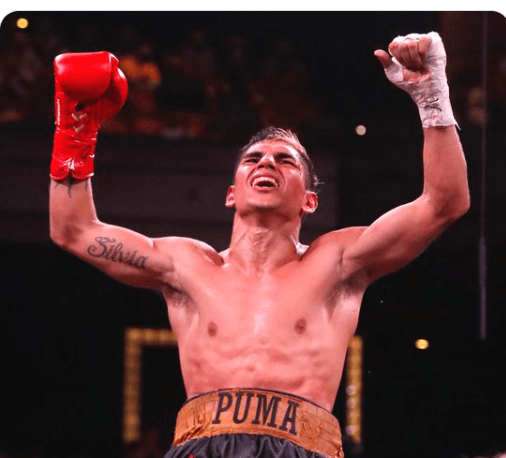
In an excellent fight climaxed by a furious 12th round, Argentina’s Fernando Daniel Martinez came off the deck to win his rematch with Kazuto Ioka and retain his piece of the world 115-pound title. The match was staged at Ioka’s familiar stomping grounds, the Ota-City General Gymnasium in Tokyo.
In their first meeting on July 7 of last year in Tokyo, Martinez was returned the winner on scores of 117-111, 116-112, and a bizarre 120-108. The rematch was slated for late December, but Martinez took ill a few hours before the weigh-in and the bout was postponed.
The 33-year-old Martinez, who came in sporting a 17-0 (9) record, was a 7-2 favorite to win the sequel, but there were plenty of reasons to favor Ioka, 36, aside from his home field advantage. The first Japanese male fighter to win world titles in four weight classes, Ioka was 3-0 in rematches and his long-time trainer Ismael Salas was on a nice roll. Salas was 2-0 last weekend in Times Square, having handled upset-maker Rolly Romero and Reito Tsutsumi who was making his pro debut.
But the fourth time was not a charm for Ioka (31-4-1) who seemingly pulled the fight out of the fire in round 10 when he pitched the Argentine to the canvas with a pair of left hooks, but then wasn’t able to capitalize on the momentum swing.
Martinez set a fast pace and had Ioka fighting off his back foot for much of the fight. Beginning in round seven, Martinez looked fatigued, but the Argentine was conserving his energy for the championship rounds. In the end, he won the bout on all three cards: 114-113, 116-112, 117-110.
Up next for Fernando Martinez may be a date with fellow unbeaten Jesse “Bam” Rodriguez, the lineal champion at 115. San Antonio’s Rodriguez is a huge favorite to keep his title when he defends against South Africa’s obscure Phumelela Cafu on July 19 in Frisco, Texas.
As for Ioka, had he won today’s rematch, that may have gotten him over the hump in so far as making it into the International Boxing Hall of Fame. True, winning titles in four weight classes is no great shakes when the bookends are only 10 pounds apart, but Ioka is still a worthy candidate.
To comment on this story in the Fight Forum CLICK HERE
Featured Articles
Emanuel Navarrete Survives a Bloody Battle with Charly Suarez in San Diego
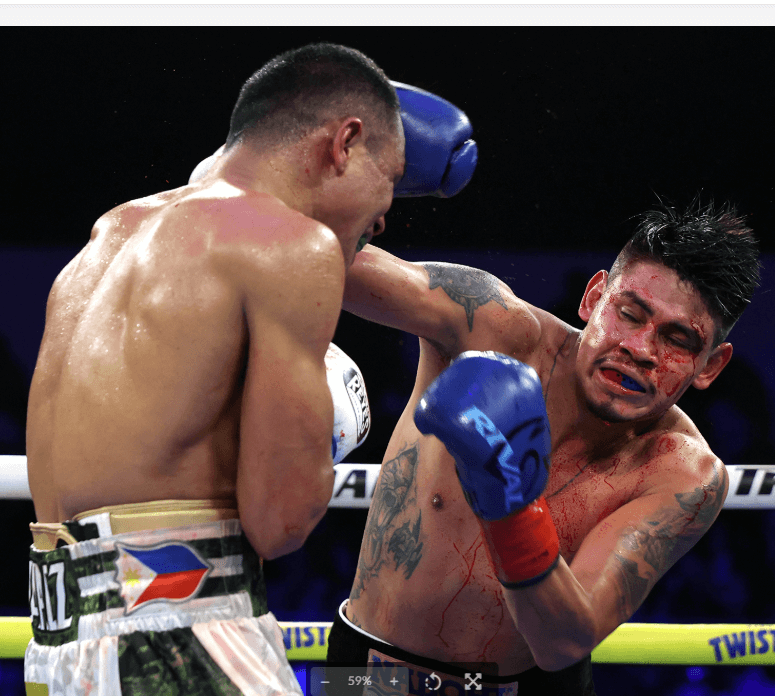
In a torrid battle Mexico’s Emanuel “Vaquero” Navarrete and his staccato attack staved off the herky-jerky non-stop assaults of Philippine’s Charly Suarez to win by technical decision and retain the WBO super feather world title on Saturday.
What do they feed these guys?
Navarrete (40-2-1, 32 KOs) and his elongated arms managed to connect enough to compensate against the surprising Suarez (18-1, 10 KOs) who wowed the crowd at Pechanga Arena in San Diego.
An accidental clash of heads opened a cut on the side of Navarrete’s left eye and forced a stoppage midway through the fight.
From the opening round Navarrete used his windmill style of attack with punches from different angles that caught Suarez multiple times early. It did not matter. Suarez fired back with impunity and was just as hungry to punch it out with the Mexican fighter.
It was savage.
Every time Navarrete connected solidly, he seemed to pause and check out the damage. Bad idea. Suarez would immediately counter with bombs of his own and surprise the champion with his resilience and tenacity.
Wherever they found Suarez they should look for more, because the Filipino fighter from Manila was ferocious and never out of his depth.
Around the sixth round the Mexican fighter seemed a little drained and puzzled at the tireless attacks coming from Suarez. During an exchange of blows a cut opened up on Navarrete and it was ruled an accidental clash of heads by the referee. Blood streamed down the side of Navarrete’s face and it was cleared by the ringside physician.
But at the opening of the eighth round, the fight was stopped and the ringside physician ruled the cut was too bad to continue. The California State Athletic Commission looked at tape of the round when the cut opened to decipher if it was an accidental butt or a punch that caused the cut. It was unclear so the referee’s call of accidental clash of heads stood as the final ruling.
Score cards from the judges saw Navarrete the winner by scores of 78-75, 77-76 twice. He retains the WBO title.
Interim IBF Lightweight Title
The sharp-shooting Raymond “Danger” Muratalla (23-0, 17 KOs) maneuvered past Russia’s Zaur Abdullaev (20-2, 12 KOs) by unanimous decision to win the interim IBF lightweight title after 12 rounds.
Both fighters were strategic in their approach with Muratalla switching from orthodox to southpaw at various times of the fight. Neither fighter was ever able to dominant any round.
Defense proved the difference between the two lightweights. Muratalla was able to slip more blows than Abdullaev and that proved the difference. The fighter from Fontana, California was able to pierce Abdullaev’s guard more often than not, especially with counter punches.
Abdullaev was never out of the fight. The Russian fighter was able to change tactics and counter the counters midway through the fight. It proved effective especially to the body. But it was not enough to offset Muratalla’s accuracy.
There were no knockdowns and after 12 rounds the judges scored it 118-110, 119-109 twice for Muratalla who now becomes the mandatory for the IBF lightweight title should Vasyl Lomachenko return to defend it.
Muratalla was brief.
“He was a tough fighter,” said Muratalla. “My defense is something I work on a lot.”
Perla Wins
Super flyweight Perla Bazaldua (2-0) eased past Mona Ward (0-2) with a polished display of fighting at length and inside.
Combination punching and defense allowed Bazaldua to punch in-between Ward’s attacks and force the St. Louis fighter to clinch repeatedly. But Ward hung in there despite taking a lot of blows. After four rounds the Los Angeles-based Bazaldua was scored the winner 40-36 on all three cards. Bazaldua signed a long term contract with Top Rank in March.
Photo credit: Mikey Williams / Top Rank
To comment on this story in the Fight Forum CLICK HERE
-
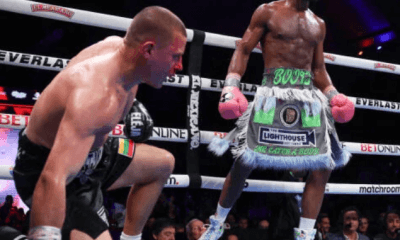
 Featured Articles4 weeks ago
Featured Articles4 weeks agoJaron ‘Boots’ Ennis Wins Welterweight Showdown in Atlantic City
-

 Featured Articles4 weeks ago
Featured Articles4 weeks agoBoxing Notes and Nuggets from Thomas Hauser
-
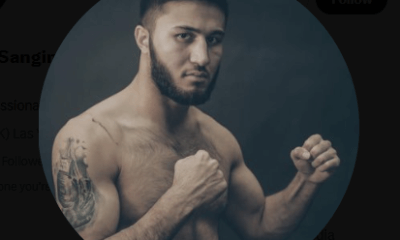
 Featured Articles4 weeks ago
Featured Articles4 weeks agoMekhrubon Sanginov, whose Heroism Nearly Proved Fatal, Returns on Saturday
-
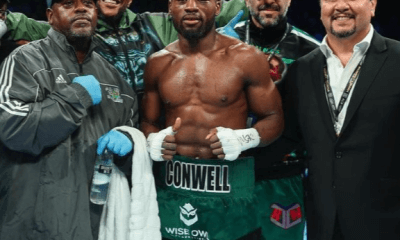
 Featured Articles3 weeks ago
Featured Articles3 weeks agoAvila Perspective, Chap. 322: Super Welterweight Week in SoCal
-
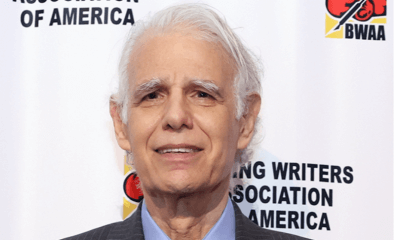
 Featured Articles4 weeks ago
Featured Articles4 weeks agoTSS Salutes Thomas Hauser and his Bernie Award Cohorts
-
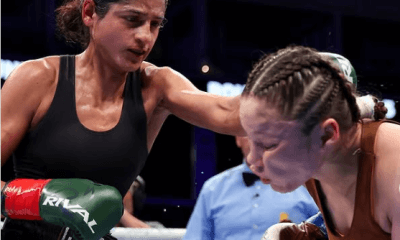
 Featured Articles3 weeks ago
Featured Articles3 weeks agoGabriela Fundora KOs Marilyn Badillo and Perez Upsets Conwell in Oceanside
-
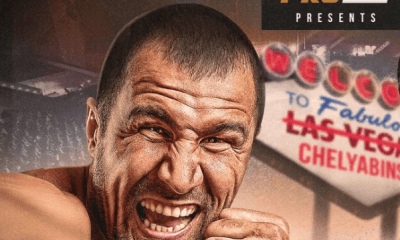
 Featured Articles3 weeks ago
Featured Articles3 weeks ago‘Krusher’ Kovalev Exits on a Winning Note: TKOs Artur Mann in his ‘Farewell Fight’
-

 Featured Articles3 weeks ago
Featured Articles3 weeks agoFloyd Mayweather has Another Phenom and his name is Curmel Moton

















